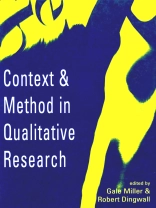A critical examination of the principles and practice of qualitative research is provided in this book which examines the interplay between context and method, making it invaluable for both the experienced and the beginning researcher.
A range of methodological and practical issues central to the concerns of qualitative researchers are addressed. These include: the validity and plausibility of qualitative methods; the problems encountered using specific techniques in a range of social settings; and the moral issues raised in qualitative research. These themes are related to practical issues which are illustrated by a breadth of examples and in-depth case studies.
The contributors look at the methods and strategies that they have used to study everyday life, and make suggestions to readers on why and how they might conduct their own studies. They raise issues that go beyond `cookbook′ discussions of issues such as how to enter social settings, manage the subjects of one′s research and ask `good′ questions in the process of formulating research strategies. These issues are addressed within the framework of the larger purposes and uses of qualitative research where specific methodological problems are not used as ends in themselves.
قائمة المحتويات
Introduction – Gale Miller
Context and Method in Qualitative Research
PART ONE: VALIDITY AND PLAUSIBILITY IN QUALITATIVE RESEARCH
The Logics of Qualitative Research – David Silverman
Producing `Plausible Stories′ – Kath M Melia
Interviewing Student Nurses
Techniques of Validation in Qualitative Research – Michael Bloor
A Critical Commentary
PART TWO: METHODOLOGICAL ISSUES IN QUALITATIVE RESEARCH
Accounts, Interviews and Observations – Robert Dingwall
Problems with Interviewing – Isobel Bowler
Experiences with Service Providers and Clients
Contextualizing Texts – Gale Miller
Studying Organizational Texts
Using Computers in Strategic Qualitative Research – Tom Durkin
Dramaturgy and Methodology – Scott A Hunt and Robert D Benford
Research Techniques from a Theatrical Perspective
PART THREE: ANALYZING INSTITUTIONS AND ORGANIZATIONS
Network Analysis and Qualitative Research – Emmanuel Lazega
A Method of Contextualization
The Interactional Study of Organizations – Robert Dingwall and P M Strong
A Critique and Reformulation
Toward Ethnographies of Institutional Discourse – Gale Miller
Proposal and Suggestions
PART FOUR: QUALITATIVE RESEARCH AS A MORAL DISCOURSE
Ethnography and Justice – David L Altheide and John M Johnson
One Branch of Moral Science – P M Strong
An Early Modern Approach to Public Policy
Conclusion – Robert Dingwall
The Moral Discourse of Interactionism
عن المؤلف
Robert Dingwall is a consulting sociologist through Dingwall Enterprises Ltd and part-time Professor of Sociology at Nottingham Trent University. He draws on more than forty years’ experience as an academic researcher studying health care, legal services, and science and technology policy at the Universities of Aberdeen, Oxford and Nottingham. Over that time, he has held grants and contracts worth more than £7 million (at 2017 prices) in total from the Leverhulme and Wellcome Trusts, ESRC, NERC, MRC, EPSRC, BBSRC, the EU, the UK Department of Health and various NHS/NIHR programmes, the Ministry of Justice, the Royal Pharmaceutical Society and the Food Standards Agency. These have resulted in 30 books and more than 100 scientific papers. Robert Dingwall is also an experienced manager: he served for five years as head of a large social science department and founded and directed what was one of Europe’s leading research institutes in science and technology studies for 12 years. Robert has been a Fellow of the Academy of Social Sciences since 2002 and an Honorary Member of the Faculty of Public Health since 2014. He was awarded the 2019 Prize for Contributions to the Socio-Legal Community by the Socio-Legal Studies Association.












